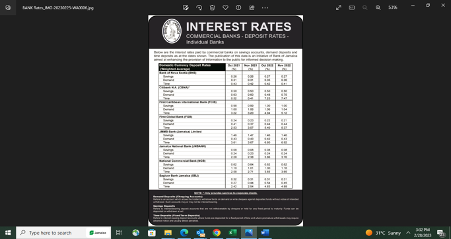There have always been talks in Jamaica about the best financial institution to place your funds while gaining a reasonable rate of return. A savings account offers you easy access, plus Jamaica Deposit Insurance Corporation (JDIC) insures safety, making them the ideal account to hold money you expect to need within the next one to five years. If you can find a high-yield savings account, all the better, since that means you enjoy an interest rate that allows your money to potentially outpace the effects of inflation and grow a little, as well.
Where things get harder, however, is when you notice that another bank’s savings account offers a higher interest rate than your current account. In that case, it can be tough to decide whether to go through the trouble of switching to another bank.
If you are contemplating moving your savings to a new bank to get a better rate, make sure you consider the following questions when making your decision.
COMPARISON OF INTEREST RATES
Savings account interest rates vary between financial institutions. Refer to the Interest Rates table (herein) for comparative rates paid by Jamaican commercial banks on savings accounts, demand deposits, and time deposits. You will notice one institution with rate as high as 1.46% monthly, versus a low of 0.08% monthly with another institution. Clearly, the bigger the difference between your current rate and the higher rate at a different bank, the more money you will earn each year in interest.

For instance, if you deposit $10,000 in a savings account with an 0.05% Annual Percentage Yield (APY) and add nothing to the account, you will have $10,005.00 after 12 months, assuming interest compounds monthly. However, that same $10,000 in a savings account with an 0.80% APY will come to $10,080.29 after one year of monthly compounding interest. In other words, after 12 months, you’ll earn $75 more with the higher APY, which might make the case for switching. When you’re considering changing banks, start by calculating exactly how much the higher APY will earn you in dollars. This can give you a clearer comparison than simply looking at percentages.
HOW MUCH MONEY IS HELD IN YOUR SAVINGS ACCOUNT?
The size of your savings account can be an important factor in your decision whether to switch banks or stay put. To start, many high-yield savings accounts have minimum required balances. This means you may only be eligible for the best APYs if you have $5,000, $10,000 or more available to put into your new savings account. In some cases, you may decide to keep your money in a lower-yield savings account until you have built it up enough to switch to an account with a higher minimum balance and better APY.
However, if you use your savings account as a place to hold a relatively small amount of money you intend to use throughout the year, chasing a higher APY may not make sense. For instance, a $500 savings balance in an account with an 0.05% APY will only grow to $500.25 in 12 months. Move your $500 to an account with an 0.80% APY, and you’ll see it grow to $504.01 in the same time frame. While the $3.76 difference in growth is notable, it’s still a very small amount of money, and you may decide convenience is more important than getting the highest growth out there.
The amount of work necessary to make a switch for a higher rate can be prohibitive, which is why you don’t see most consumers switching from bank to bank several times a year, chasing the best available savings APY. However, if you currently enjoy only a very low APY and have a large balance to transfer, it may make sense to switch to find a better rate.
In addition, understanding if the higher rate is introductory and what fees are associated with the account can help you calculate whether the higher APY is worth moving your money. Finally, recognizing the value of convenience and maintaining your current financial system also should play a part in your decision-making process.
Better savings rates are out there, but make sure you know what you may be giving up before you decide to make the leap.
Contact Darren Brown at [email protected]






